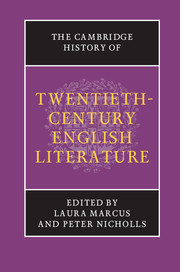Book contents
- Frontmatter
- Introduction
- PART ONE WRITING MODERNITY
- 1 Science and knowledge at the beginning of the twentieth century: versions of the modern Enlightenment
- 2 The Victorian fin de siècle and Decadence
- 3 Empire and modern writing
- 4 The gender of modernity
- PART TWO THE EMERGING AVANT-GARDE
- PART THREE MODERNISM AND ITS AFTERMATH, 1918–1945
- PART FOUR POST-WAR CULTURES, 1945–1970
- PART FIVE TOWARDS THE MILLENNIUM, 1970–2000
- Bibliography
- Index
- References
2 - The Victorian fin de siècle and Decadence
from PART ONE - WRITING MODERNITY
Published online by Cambridge University Press: 28 March 2008
- Frontmatter
- Introduction
- PART ONE WRITING MODERNITY
- 1 Science and knowledge at the beginning of the twentieth century: versions of the modern Enlightenment
- 2 The Victorian fin de siècle and Decadence
- 3 Empire and modern writing
- 4 The gender of modernity
- PART TWO THE EMERGING AVANT-GARDE
- PART THREE MODERNISM AND ITS AFTERMATH, 1918–1945
- PART FOUR POST-WAR CULTURES, 1945–1970
- PART FIVE TOWARDS THE MILLENNIUM, 1970–2000
- Bibliography
- Index
- References
Summary
The modern roots of Decadence were in 1830s American Gothic and late Romanticism. Edgar Allan Poe elevated disease, perversity and decay to new heights of artistic expression. Alfred Tennyson’s Poems of 1832, the poems of languor rather than of politics – ‘The Lady of Shalott’, ‘The Lotus-Eaters’ and ‘The Palace of Art’ – evoked a philosophy of Inaction that would later be elaborated in Oscar Wilde’s Intentions (1891) and in the American Ralph Cram’s The Decadent: The Gospel of Inaction (1893). Although Poe’s success in the United States was trivial until he was discovered by Charles Baudelaire, his perversity and Tennyson’s celebrity – in the words of the latter’s Ulysses ‘I am become a name’ – were the two touchstones of Decadence: the naturalistic uniqueness of the individual psyche and the recognition of ‘brand’ or personal commodification that would be central to modern consciousness. Baudelaire took up the first in Les Fleurs du Mal, censored by the French state in 1857, and the latter in the figure of the Dandy in The Painter of Modern Life (1863). Baudelaire began translating Poe (culminating in 5 volumes) in 1848, and thereby turned from Romantic nature to urban perspectives and personalities. His successor, Stephane Mallarmé, known as the founder of French Symbolism, took up objects as well, and infused them with non-material properties as a counter to a too-materialistic age.
In his ‘Further Notes on Edgar Poe’ (1857), Baudelaire reappropriated the intentionally negative phrase of his critics, ‘a literature of decadence’, in a revolutionary, affirmative way to describe a literary progress (ironically parodying the great theme of the age) from infancy, through childhood and adolescence, towards a mature Decadence.
- Type
- Chapter
- Information
- Publisher: Cambridge University PressPrint publication year: 2005
References
- 2
- Cited by



